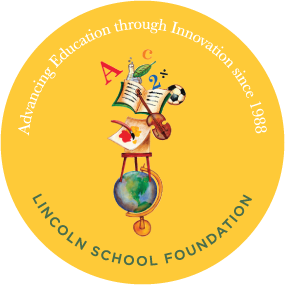History
Looking Back
In the summer of 1988, a local journal published an article announcing the organization of the Lincoln School Foundation. Founded by the parents of children attending the Lincoln Public Schools, the Foundation aimed to “enrich the school system without replacing or supplanting public support for the schools”, recognizing that there are “needs which, while not appearing to be vital to its basic function, could immeasurably enhance the effectiveness of and enthusiasm for our schools”.
As a private non-profit organization of parents and residents, the Foundation was to work in collaboration with school principals and staff to screen proposals that aligned with its mission. It would “raise and dispense funds in conjunction with established educational bodies to support the commitment to excellence in teaching and to develop collaboration and ideas among members of our communities and institutions”.
Colleen Pearce, Smith School Art Teacher
Colonial Rug Braiding, 2014-15
In the almost thirty years since the article was written, the Foundation’s organizing principles remain largely the same. The LSF raises funds from within the community to enable teachers and staff to reach beyond traditional programs and uncover exciting and innovative tools and techniques to bring to the classroom, and it provides the seed money to make these programs a reality. A single committee considers grant applications from both the Lincoln and Hanscom campuses, and works closely with each school to identify grants that are well-aligned with LSF and district goals. Grants are awarded in the spring, and, as in 1988, support teachers in their commitment to promote student learning and engagement.
But while the organization looks very much the same, the LSF and district goals have evolved, to directly engage with ideas about how to transform education for the future.
Education for the 21st Century
Two years ago, the LSF spent a great deal of time thinking about how to best support educational reform in the 21st century. Under the leadership of Tara Mitchell and DJ Mitchell, the LSF reached out to local thought leaders, including Jen Holleran – LSF Member-at-Large and Executive Director of Mark Zuckerberg’s education initiative Startup:Education. This process was instrumental in reframing how the LSF should approach its work. Central to this conversation was a growing awareness of how the current education system was created, what type of skills children will need in the future, and how some school districts and thought leaders are transforming education for the 21st century in a variety of contexts. The LSF also actively engaged the Superintendent's Office, school principals and the School Committee in this conversation, helping to establish a framework for collaboration between the LSF and the school administration.
This outreach and collaboration also pushed members of the Board to attend film screenings of the documentaries “Race to Nowhere” and “Most Likely to Succeed” at area schools, and to support a joint film viewing, with the School Administration and School Committee, of “Beyond Measure”. In addition, LSF Co-Chairs were asked to join the February School Committee meeting to further discussions and see how the LSF might be able to bring more of the themes of these films into our community.
In April of that year, the LSF encouraged the community to attend the District Strategic Plan Community Forum held by the School Committee. This forum showcased innovative teaching approaches that were currently in place at both Hanscom and Lincoln school campuses and asked the community for input as to what “success” would look like for the students attending and graduating from LPS. Through this work in the winter and spring of 2016 it became clear that the LSF, the School Committee, and the School Administration were aligned in a desire to propel education into the 21st century, using innovative teaching techniques that embrace creativity, authenticity, risk-taking, differentiation, and collaboration.
In the fall of 2016, after further inspiration by guest speaker Jal Mehta, associate professor at the Harvard Graduate School of Education, the LSF revised its mission statement to read:
“To inspire and fund innovation that fosters critical thinking, collaboration, and authentic learning experiences for every student in the Lincoln Public Schools.”
Also in the fall, Superintendent Becky McFall unveiled her goals, along with the District Strategic Priority Map. Both named the Lincoln School Foundation as a key partner in "activating the spirit of innovation and risk taking" by providing “an avenue of opportunity for faculty to take instructional risks that engage students in authentic and innovative ways.” The District budgeted specifically to fund innovative strategic initiatives and, combined with LSF’s fundraising, the pool of resources available for faculty and staff was even greater than in years past.
Excerpted from the Lincoln Review, Fall 2017

